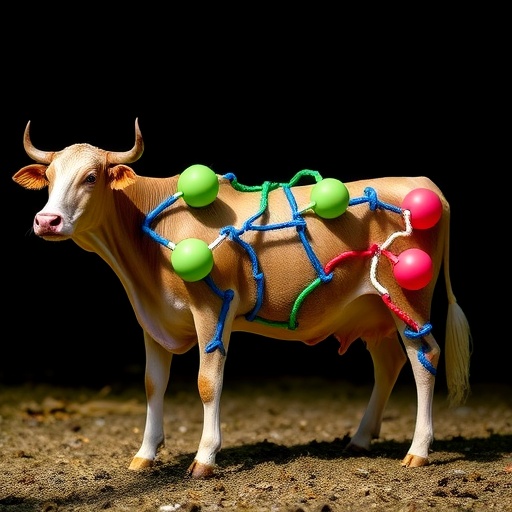In a groundbreaking study published in BMC Genomics, researchers led by Y. Zan have unveiled a comprehensive analysis of the ubiquitin-specific protease (USP) gene family in cattle. This genome-wide identification and characterization of USP genes highlights their potential roles in muscle development and myogenesis, presenting novel insights into bovine genetics and offering implications for the livestock industry and genetic research.
The study emphasizes the critical function of USP genes in regulating protein degradation and modification within cells. Ubiquitination, a process by which proteins are tagged for degradation, is essential in maintaining cellular homeostasis. USPs act as key players in this process, deconjugating ubiquitin from target proteins, and thus, regulating their turnover. This gives USPs a crucial role in various biological processes, including muscle development, which is of specific interest in the context of cattle breeding and meat production.
Zan and colleagues utilized advanced genomic techniques to conduct a thorough identification of the bovine USP gene family. This involved the analysis of various genomic databases and the application of bioinformatics tools to annotate the full repertoire of USP genes present in the cattle genome. Their methodology not only provided a detailed account of the gene family but also identified unique characteristics that differentiate bovine USPs from those in other species, enhancing our understanding of bovine biology.
Particularly, the study delves into muscle-specific USP genes, which have garnered attention due to their potential influence on myogenesis—the process through which muscle fibers are formed. Myogenesis is a complex multi-step process that is tightly regulated, and any disruption can lead to significant health and economic impacts in cattle populations. By focusing on muscle-specific USPs, the researchers illuminate the molecular pathways that govern muscle development and reveal promising targets for enhancing muscle growth through selective breeding or genetic engineering.
The team’s results demonstrate that several muscle-specific USP genes show differential expression patterns during key developmental stages, indicating their significant role in muscle growth regulation. In fact, the study provides compelling evidence that certain USPs are upregulated during myoblast differentiation, while others appear to play roles in muscle fiber maturity and maintenance. These findings pave the way for novel breeding strategies aimed at improving muscle quality and yield in cattle, benefiting both farmers and consumers.
Moreover, understanding the genetic basis of muscle development in cattle could yield broader implications beyond agriculture. For instance, insights drawn from this study might enhance knowledge of muscle biology in other mammals, including humans, potentially aiding in the treatment of muscle-wasting diseases or injuries. This cross-species relevance underscores the importance of such genetic research in providing therapeutic insights.
The research also highlights the potential for targeting USP genes as a method for controlling traits associated with meat quality. Since myogenesis directly influences muscle fiber composition, understanding the genetic factors that regulate this process could lead to advances in how livestock is bred for desirable characteristics such as marbling, tenderness, and overall growth rate.
In addition to the focus on USP genes, the study outlines future directions for research. The researchers suggest that functional studies, involving gene editing technologies such as CRISPR-Cas9, could enhance our ability to manipulate USP gene expression directly. This could lead to practical applications in livestock management, where tailored breeding programs could be developed based on the identified genetic markers.
Furthermore, the establishment of a comprehensive USP gene database for cattle will provide a valuable resource for ongoing research. Genomic data such as this forms the backbone for a deeper understanding of livestock genetics, allowing researchers to propagate findings and foster innovations across the agricultural sector.
In summary, the pioneering work of Zan and colleagues not only advances our understanding of the ubiquitin-specific protease gene family in cattle but also opens avenues for futuristic agricultural practices aimed at optimizing meat production. Their research blends fundamental genetics with practical application, aligning with the ongoing efforts to refine livestock breeding methodologies while ensuring animal welfare and productivity.
This study thus stands as a testament to the importance of genomic research in modern agriculture, bridging the gap between science and the industry, and setting a precedent for future investigations into the genetic underpinnings of economically important traits in livestock.
Through this ambitious endeavor of genome-wide identification and characterization of USPs, there lies potential for reshaping the landscape of cattle breeding, providing insights that could revolutionize the meat industry, and contributing to global food security challenges.
With the implications of the study spanning not only agricultural practices but also offering insights into mammalian biology, it is undoubtedly a significant contribution to both the scientific community and the livestock industry.
As researchers continue to delve into the complexities of cattle genomics, studies like these remind us of the intricate connections between genetics, biology, and practical outcomes within the realm of agriculture, unveiling new possibilities that remain ripe for exploration.
With the foundational work established by Zan and his team, the future of cattle breeding and meat production appears promising, wherein informed genetic strategies could lead to enhanced sustainability and efficiency in livestock farming, ultimately serving the growing global population.
Through continuous innovation and research, the agricultural field will not only adapt to meet demands but will also pave the way for a more genetically informed and sustainable approach to food production.
The findings of this research thus resonate beyond academic inquiry and affirm the critical role of genetic understanding in shaping the future of animal husbandry worldwide.
Subject of Research: Ubiquitin-specific protease (USP) gene family in cattle and its influence on muscle development.
Article Title: Genome-wide identification and characterization of the ubiquitin-specific protease (USP) gene family in cattle: primary analysis of muscle-specific USP genes and their influence on myogenesis.
Article References:
Zan, Y., Li, J., Song, F. et al. Genome-wide identification and characterization of the ubiquitin-specific protease (USP) gene family in cattle: primary analysis of muscle-specific USP genes and their influence on myogenesis.
BMC Genomics 26, 760 (2025). https://doi.org/10.1186/s12864-025-11670-2
Image Credits: AI Generated
DOI: 10.1186/s12864-025-11670-2
Keywords: Ubiquitin-specific protease, USP gene family, myogenesis, cattle genetics, muscle development, genome-wide analysis.




